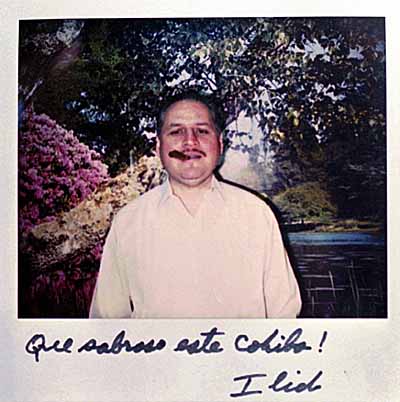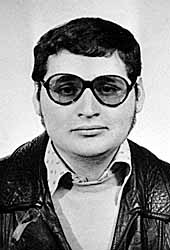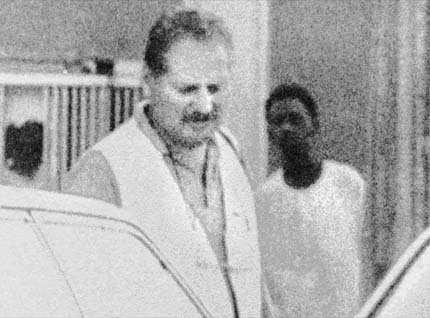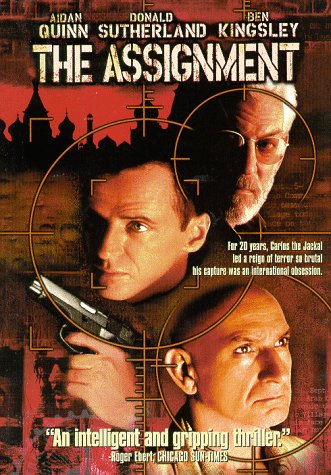|
Carlos the Jackal Before there was Osama bin Laden, before there was Ramzi Yousef, there was the Jackal.
Before there was Osama bin Laden, before there was Ramzi Yousef, there was the Jackal. He was born in Venezuela, under the more sane name of Ilich Ramirez Sanchez, but history will remember him as Carlos the Jackal. He was the first superterrorist, back in the days when terrorism was still far enough from U.S. soil for Americans to consider it glamorous. The Jackal's exact entry into the world of international terrorism remains enigmatic, appropriately enough. He was born in 1949 to a family headed by a man described as a "millionaire Marxist" by the BBC. So the young Jackal was no stranger to paradox. The Jackal had a talent for languages, enhanced by travels during his youth. As a teenager, he was involved in various Communist after-school activities, and in 1966 he moved to London with his mother and brothers (his parents had divorced), where he continued his schooling. There is a lot of ambiguity in between "he was born" and "moved to London." Various accounts describe the young Jackal receiving terrorist training at an early age, possibly in Cuba and/or under the supervision of the KGB. Whatever the case, he debuted as a terrorist during the early 1970s. His studies had taken him to the Soviet Union, where he took an interest in the conflict between Israel and the Palestinians, even as his talents were nurtured by the KGB. The Soviets sent him to the Middle East for terrorist training around 1970, when he officially took the name "Carlos." ("The Jackal" was appended later, after investigators found a copy of spy thriller "The Day of the Jackal" in one of Carlos' hideouts.) Carlos was a quick learner, and it didn't take long for him to become bored with his training. He took part in guerrilla fighting against the Jordanian government for a while, and he discovered he was very good at killing people. After a year or so of training, he was sent back to London where he scouted political and society targets. Carlos was thought to have had some involvement in the 1972 terrorist attack on the Munich Olympics, when Arab gunmen killed several Israeli athletes, but he didn't emerge as a prominent international figure until 1975, when he led a team of terrorists who seized about 70 hostages during an OPEC meeting in Vienna. Three people were killed in the attack, which resulted in the kidnapping of oil ministers from 11 OPEC nations. The hostages were eventually released through negotiations. Carlos was disavowed by the Palestinian groups that initially underwrote his activities as he began to revel in the notoriety of his terrorist crime wave. After his high-profile success in Vienna, Carlos went on a spree across Europe. He executed several bombings in Britain and France, killing dozens and injuring hundreds.
Carlos continued to focus on attacks in France through the mid-80s, and he wasn't always courteous about limited casualties, with attacks of varying lethality in airports, city streets and urban gathering places. One such attack in 1982 injured 63 people. In between strikes on European targets, Carlos found safe haven in countries like Lebanon, Yemen, Syria, Iraq and Libya, where he was treated as a highly sought-after specialist. As his fame grew, Carlos increasingly played the mercenary, making himself available to various disenfranchised Arab nations and Islamic extremists as a terrorist for hire. He is thought to have amassed a personal fortune in the tens of millions of dollars through these activities and the occasional ransom payment. By 1980, Carlos was a marked man. The Central Intelligence Agency, French intelligence and Interpol were all intensively searching for the Jackal, who was holed up in Yemen much of the time. The CIA tried to have him assassinated, but the effort (as with many of the CIA's attempted assassinations) failed.
When it became clear the French were none too keen on releasing the pair, Carlos bombed a French facility in Beirut. Two weeks later, he bombed a passenger train on French soil, killing five and injuring dozens. A couple weeks after that, his men assassinated a French embassy worker and his pregnant wife in Lebanon, then they bombed a French embassy in Austria, then a restaurant in Paris. Despite all this, the pair were convicted and sentenced. Kopp served five years of a six-year sentence (with a year off for good behavior) and rejoined the Jackal after her release. After a 1983 attack in West Berlin, Carlos found that he had worn out his welcome in previously hospitably Soviet bloc nations in Europe, which were increasingly worried about sharing the blame for the Jackal's murder spree. Carlos was also becoming alienated from pro-Palestinian factions, due to the fact that they actually believed in something whereas the Jackal increasingly appeared to be mostly concerned with getting his rocks off. After several of his safehouses around the world were shut down by increasingly edgy governments, Carlos fled to Syria, which offered him shelter in exchange for his professional services. Even the Syrians eventually wearied of this, and revised the deal so that Carlos was allowed to stay as long as he didn't work.
After exhausting his options, Carlos ended up in the Sudan, which had become a haven for terrorists such as Osama bin Laden. Under the protection of a local Islamic fundamentalist sheikh, Carlos quickly offended his hosts with his playboy ways, including liquor-soaked parties and lots of wild sex. The sheikh decided to hand the Jackal over to the French. After an elaborate sting executed with the cooperation of Sudanese authorities, the Jackal was arrested without dignity in 1994, as he was recovering from testicular surgery to treat a low sperm count. With more than 80 deaths, probably thousands of injuries and millions of dollars in property damage to his credit, the only question was which crime to try him for. In 1997, Carlos the Jackal was sentenced to life in prison for three murders. While further trials may be possible, France has no death penalty, so it's likely the Jackal will remain right where he is for the rest of his life. Once a feared killer, now just another prisoner, Carlos staged a brief hunger strike but now seems destined to fade into Hollywood-style obscurity, his life and supposed causes reduced to star vehicles for the likes of Bruce Willis, Matt Damon and Aidan Quinn. Yeah, it's undignified, but it's better than Khalid Shaikh Mohammed is likely to get...
|
 Carlos assassinated British businessman Edward Seiff, and launched a grenade attack on an Israeli bank with offices in London. He bombed French newspaper buildings, making courteous warning calls and setting the bombs for late-night detonations in what he claimed was a bid to "limit casualties."
Carlos assassinated British businessman Edward Seiff, and launched a grenade attack on an Israeli bank with offices in London. He bombed French newspaper buildings, making courteous warning calls and setting the bombs for late-night detonations in what he claimed was a bid to "limit casualties." In 1982, a cell led by Carlos attempted to destroy a nuclear reactor in central France, but the effort was foiled when their rocket-powered explosives failed to penetrate the facility's concrete walls. Later that year, French authorities arrested two of the Jackal's operatives, including the Jackal's wife, Magdalena Kopp, a woman with connections to the
In 1982, a cell led by Carlos attempted to destroy a nuclear reactor in central France, but the effort was foiled when their rocket-powered explosives failed to penetrate the facility's concrete walls. Later that year, French authorities arrested two of the Jackal's operatives, including the Jackal's wife, Magdalena Kopp, a woman with connections to the  Carlos and his wife remained in Syria until Iraq invaded Kuwait in 1990. Rumors began to reach the CIA that
Carlos and his wife remained in Syria until Iraq invaded Kuwait in 1990. Rumors began to reach the CIA that